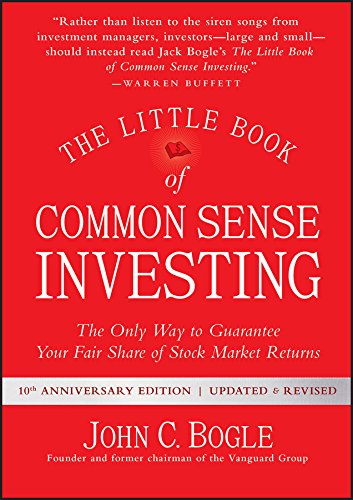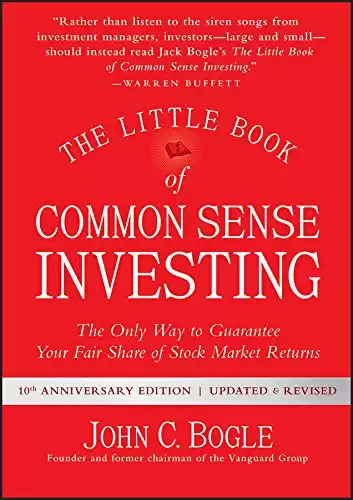Overview : The Little Book of Common Sense Investing
-
Book Title: The Little Book of Common Sense Investing
-
Author: John C. Bogle
-
Publication Date: March 2007
-
Rating: 4.5
-
price: $16
-
Pages: 270
About the Author
John C. Bogle, the founder of Vanguard Group, revolutionized investing with his advocacy for low-cost index funds. Known for his commitment to investor education and long-term wealth building, Bogle's groundbreaking insights have empowered millions to invest with simplicity and common sense.
Introduction to The Little Book Of Common Sense Investing
In the ever-evolving landscape of personal finance and investing, few works have stood the test of time quite like John C. Bogle's "The Little Book of Common Sense Investing." As the founder of the Vanguard Group and a pioneer of index investing, Bogle's insights have revolutionized how millions approach wealth-building. This comprehensive review explores the core principles of Bogle's philosophy, its impact on the investment world, and why this book remains an essential read for anyone serious about mastering their financial future.
The Little Book of Common Sense Investing Summary
At its heart, "The Little Book of Common Sense Investing" advocates for a remarkably straightforward approach: instead of trying to outsmart the market, investors should aim to own it through low-cost index funds. Bogle's central thesis is that these funds, which track broad market indices like the S&P 500, consistently outperform the majority of actively managed mutual funds over the long term.
Best quote from The Little Common Sense of Investing
"The stock market is a giant distraction to the business of investing."
Key Principles:
- Embrace index investing for broad market exposure
- Minimize costs to maximize returns
- Adopt a long-term perspective
- Understand the power of compound interest
- Resist the urge to time the market
Bogle meticulously breaks down the costs associated with active investing—management fees, trading expenses, and taxes—demonstrating how these erode returns over time. In contrast, he positions index funds as a more efficient vehicle for wealth accumulation, thanks to their minimal expenses and inherent diversification.
Analysis of Themes
The Folly of Active Management
One of the book's central themes is the critique of active fund management. Bogle presents compelling evidence that most professional money managers fail to beat their benchmark indices consistently. He argues that the high fees charged by these funds, combined with the difficulty of consistently picking winning stocks, make active management a losing proposition for most investors.
The Power of Simplicity
Bogle champions a return to the fundamental purpose of investing: providing capital for businesses to grow and generate returns. He criticizes the Wall Street culture of speculation and short-term trading, instead advocating for a patient, disciplined approach to wealth-building.
Market Efficiency and the Random Walk Theory
The book delves into the concept of market efficiency, drawing on academic research to support the idea that stock prices reflect all available information. This underpins Bogle's argument for index investing, as it suggests that consistently beating the market through stock selection is extremely difficult.
Writing Style
Bogle's writing is accessible and engaging, making complex financial concepts digestible for readers of all backgrounds. He employs a mix of data-driven analysis, historical anecdotes, and personal insights to illustrate his points. The book is peppered with memorable quotes and analogies, such as:
"Don't look for the needle in the haystack. Just buy the haystack!"
This approachable style has contributed significantly to the book's enduring popularity and influence.
Strengths and Weaknesses
Strengths:
- Clear, evidence-based arguments for index investing
- Accessible explanation of complex financial concepts
- Practical advice for implementing a low-cost investment strategy
- Strong ethical stance on investor-friendly practices
Weaknesses:
- Singular focus on index investing may overlook other valid strategies
- Some readers may find the repeated emphasis on indexing redundant
- Limited discussion of international investing and emerging markets
The Little Book of Common Sense Investing Related Books
While "The Little Book of Common Sense Investing" shares themes with other personal finance classics like "A Random Walk Down Wall Street" by Burton Malkiel and "The Intelligent Investor" by Benjamin Graham, Bogle's work stands out for its laser focus on index investing and its practical implementation. Compared to more recent works like "The Simple Path to Wealth" by JL Collins, Bogle's book provides a deeper historical context and a more comprehensive analysis of the investment landscape. However, it doesn't delve into newer topics like cryptocurrency investing or robo-advisors, which have gained prominence in recent years.
Impact on the Investment Industry
The influence of Bogle's work on the investment world cannot be overstated. Since the book's publication, there has been a massive shift towards passive investing, with trillions of dollars flowing into index funds and exchange-traded funds (ETFs). This trend has democratized investing, making it more accessible and cost-effective for individual investors. The rise of low-cost index funds has also put pressure on traditional asset managers to lower their fees and improve transparency. This "Bogle effect" has reshaped the financial services industry, benefiting investors across the board.
Relevance in Today's Market
Despite being published in 2007, the core principles of "The Little Book of Common Sense Investing" remain highly relevant in today's rapidly changing financial landscape. The recent volatility in cryptocurrency markets and the rise of meme stocks have only underscored the wisdom of Bogle's steady, long-term approach to investing. However, readers should supplement this book with more current resources to stay informed about recent market trends, including:
- The evolution of ESG (Environmental, Social, and Governance) investing
- The impact of zero-commission trading platforms
- The role of artificial intelligence in financial markets
Highlights from The Little Book of Common Sense Investing" by John C. Bogle
Power of Indexing: Advocates for low-cost index funds as the most effective way to build wealth over time.
Avoid Speculation: Focuses on the long-term growth of the market rather than short-term trading and speculation.
Cost Matters: High fees and expenses can erode returns, making low-cost funds crucial for maximizing investment gains.
Market Returns Over Manager Returns: Believes the average investor can outperform most fund managers by simply capturing overall market returns.
Stay the Course: Recommends a disciplined, patient approach to investing, resisting market timing and emotional reactions.
Simple is Best: Emphasizes simplicity in investment choices for consistent, reliable growth.
Conclusion
"The Little Book of Common Sense Investing" is a timeless guide that distills the essence of prudent investing into a clear, compelling narrative. John C. Bogle's insights challenge the status quo of active management, urging investors to embrace the power of broad market exposure and low costs. For anyone looking to build long-term wealth and navigate the complexities of the financial markets with confidence, this book is an indispensable resource. Its lessons are as relevant today as they were at the time of its writing, cementing Bogle's legacy as a champion of the individual investor.





